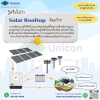Revealing 5 advantages of working on "floating solar farms"

In addition to solar farms and rooftops, there is currently floating solar cells, which is another interesting technology. " Open 5 advantages of working on floating solar farms"
1. Easy to adjust the light angle.
Installing on the water surface allows the solar panel to be adjusted to receive sunlight better, increasing the efficiency of electricity production.
2. Easy to install,
the structure is lightweight and floats on the water, making the installation process convenient and fast.
3. Reduces water evaporation.
Solar panels floating on water help reduce water loss from evaporation. Suitable for water sources that need to be conserved.
4. More stable electricity production.
Water temperature helps reduce the heat of the solar panels, resulting in more efficient panels.
5. Saves space on the ground.
Helps reduce the use of space on land. Suitable for limited areas.
Floating solar cells are another alternative for modern renewable energy. They are much more efficient and easier to install than land installations. Because they rely on the nature of water to dissipate heat, electricity production is more stable. It is therefore a valuable use of available resources.
1. Easy to adjust the light angle.
Installing on the water surface allows the solar panel to be adjusted to receive sunlight better, increasing the efficiency of electricity production.
2. Easy to install,
the structure is lightweight and floats on the water, making the installation process convenient and fast.
3. Reduces water evaporation.
Solar panels floating on water help reduce water loss from evaporation. Suitable for water sources that need to be conserved.
4. More stable electricity production.
Water temperature helps reduce the heat of the solar panels, resulting in more efficient panels.
5. Saves space on the ground.
Helps reduce the use of space on land. Suitable for limited areas.
Floating solar cells are another alternative for modern renewable energy. They are much more efficient and easier to install than land installations. Because they rely on the nature of water to dissipate heat, electricity production is more stable. It is therefore a valuable use of available resources.


